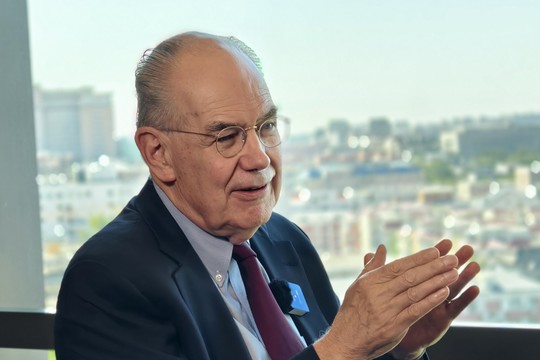John Mearsheimer
Photo: Global Times
In mid-October, 77-year-old University of Chicago professor John Mearsheimer visited China. He delivered lectures at Chinese universities and engaged in a debate on global order and US-China relations with Yan Xuetong, director of the Institute of International Studies, Tsinghua University.
Mearsheimer is a prominent realist scholar in international relations. He gained recognition for his 2001 book The Tragedy of Great Power Politics, which argues that conflict between great powers is inevitable.
More than 20 years later, the international landscape has shifted dramatically, but Mearsheimer's views remain unchanged. In an exclusive interview with the ‘Global Times’ reporters Liu Xin, Zhao Juecheng and Yang Sheng in Beijing, Mearsheimer shared his concerns about current issues like China-US relations and the Ukraine crisis, criticizing US foreign policy. He also predicts that security competition between the US and China will intensify.
The following is a part of the interview with Mearsheimer.
Global Times: In recent years, China has described the global situation as a "major change not seen in a century." What are your thoughts on this?
Mearsheimer: I think it's true. The structure of the system has changed fundamentally.
When I was young, the world was bipolar. The US-Soviet competition defined international politics in large part. The Soviet Union disappeared in December 1991, and we went from a bipolar world to a unipolar world. In around 2017 that unipolar world came to an end, and we moved into a multipolar world. We went from a world where the US was the only great power on the planet to one where the US, China, and Russia were all great powers.
This is the first time that we have faced a multipolar world since World War II when you go from unipolarity to multipolarity.
The change in China-US relationship has also been huge. During the unipolar period, China-US relations were generally very good. Then when we went from unipolarity to multipolarity, which meant China was now a great power, it was a peer competitor of the US, and relations between the US and China fundamentally changed and became much more conflictual.
GT: What is your primary concern regarding complicated international relations at this time?
Mearsheimer: I'm concerned about three big issues. One is I'm concerned about the China-US relationship. I have long argued that relationship would be intensely competitive. I'm concerned that competition might turn into a war, and I don't want that to happen.
I'm also deeply concerned about the war in Ukraine and the possibility of escalation where the US, and NATO more generally, come into the conflict. Conflict between Russia on one side and Ukraine and the West on the other side will go on for decades… The US has done a terrible job handling the situation in Ukraine. The US is principally responsible for causing the war in Ukraine.
Then I'm concerned about the Middle East, and the wars that are taking place there. As is the case with Ukraine, it is possible that the US and Russia could be pulled into a war in the Middle East, although that's not likely.
GT: Do you think US foreign policy is contributing to global stability or fostering chaos?
Mearsheimer: I think it's fostering chaos if you have to choose between those two descriptions. It's fostering chaos in Ukraine and the Middle East. The US should have acted in fundamentally different ways.
The principal cause of the war in Ukraine was the West's efforts to bring Ukraine into NATO. The US was the driving force behind that decision. And the Russians made it clear from the very beginning that was unacceptable. Nevertheless, we continue to push to bring Ukraine into NATO.
Instead of trying to shut the war down, the US has, if anything, sought to push it forward, aiming to keep it going so Ukraine can defeat the Russians. The US should not have tried to bring Ukraine into NATO. Once the war started, the US should have gone to great lengths to prevent it.
With regard to the Middle East, the US should have gone to great lengths to push Israel to accept the Palestinian state, which is the root cause of the problem in the Middle East. The US should now be trying to prevent the war in Gaza, shut down the war with regard to Hezbollah, and make sure that the war that is unfolding involving Iran on one side and the US and Israel on the other side is brought to an end immediately. But the US is not doing that. The US is helping the Israelis to cause greater and greater trouble in the Middle East.
If you look at our performance on the world stage, we have been fostering chaos, not contributing to international stability.
GT: You assert that the US cannot accept China emerging as a peer power. What motivates you to engage in these exchanges with China?
Mearsheimer: I don't think the root of the problem is Chinese behavior. I don't think the Chinese are the bad guys, and the Americans are the good guys. I think this is just how international politics works. And although I'm an American, the fact is that this is a case of a tragic situation.
I think it's very important that people hear my argument and think about it. You don't have to agree with me, but it's very important to understand the argument. Because if you're interested in maximizing our prospects of avoiding a hot war, understanding the nature of the conflict really matters.
read more in our Telegram-channel https://t.me/The_International_Affairs

 8:58 16.11.2024 •
8:58 16.11.2024 •























